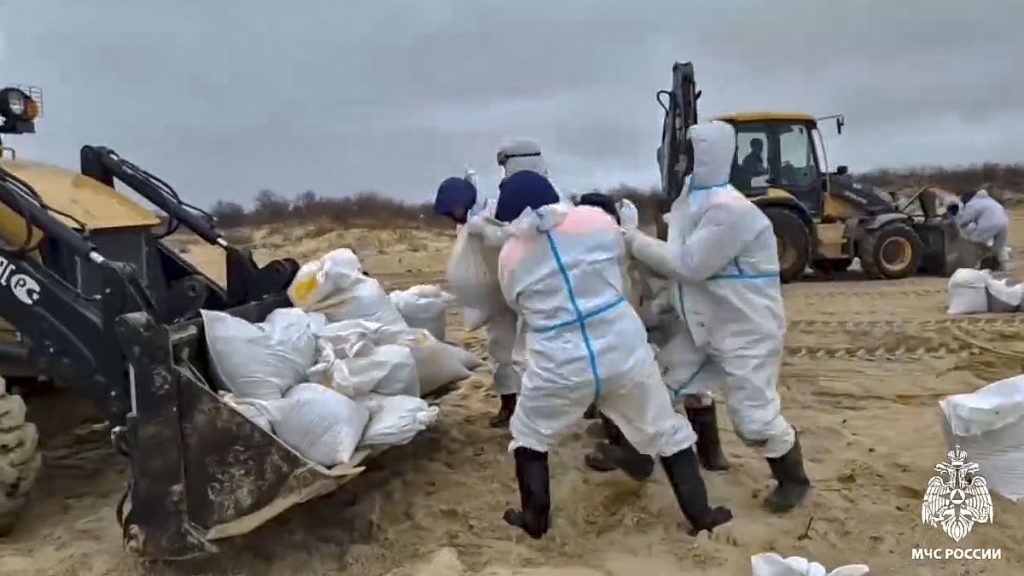The Kerch Strait, a vital maritime passage connecting the Sea of Azov to the Black Sea, has become the site of an unfolding ecological crisis. Approximately three weeks ago, two tankers suffered incidents resulting in a substantial fuel oil spill. The strait, which separates the Crimean Peninsula from Russia’s Krasnodar region, is a crucial shipping route and has also been a focal point of geopolitical tension between Russia and Ukraine since Russia’s annexation of Crimea in 2014. This recent spill has exacerbated existing environmental concerns and brought the fragility of the region’s ecosystem into sharp focus.
The environmental consequences of the spill are becoming increasingly apparent. The Delfa Dolphin Rescue and Research Centre has reported at least 32 dolphin deaths linked to the fuel oil contamination. While a total of 61 deceased cetaceans have been recorded since the incident, the condition of some carcasses suggests prior mortality, potentially unrelated to the spill. However, the timing and concentration of dolphin deaths following the spill strongly implicate the oil as a major contributing factor. Notably, many of the deceased dolphins belong to the endangered Azov species, further highlighting the spill’s impact on vulnerable marine populations. The ongoing discovery of bodies washed ashore underscores the prolonged and insidious nature of the pollution’s effects.
The spill’s impact has extended beyond marine life, prompting regional emergency declarations. Sevastopol, located approximately 250 kilometers from the spill site in the Kerch Strait, declared a state of emergency after oil reached its shores. Clean-up efforts involving local authorities and volunteers were initiated to remove the oil from affected beaches. Similarly, the Krasnodar region, situated closer to the spill origin, declared a region-wide emergency. Extensive clean-up operations involving thousands of personnel have been underway, focusing on removing contaminated sand and soil along the coastline. The sheer volume of contaminated material, estimated to be in the hundreds of thousands of tons, speaks to the magnitude of the environmental challenge.
The scale and severity of the spill have drawn international attention, with Russian President Vladimir Putin labeling it an “ecological disaster.” Estimates of the total amount of mazut, a heavy, low-quality fuel oil, released into the environment reach up to 200,000 tons. The long-term consequences for the marine ecosystem, including the potential for bioaccumulation of toxins in the food chain, remain a significant concern. The incident has also reignited discussions about maritime safety regulations and the potential environmental risks associated with shipping in the Kerch Strait.
The Kerch Strait’s strategic importance has been a source of ongoing conflict between Russia and Ukraine. Ukraine’s 2016 legal action against Russia in the Permanent Court of Arbitration, alleging illegal seizure of control over the strait, highlights the contested nature of the region. Mykhailo Podolyak, an advisor to Ukrainian President Volodymyr Zelenskyy, has characterized the oil spill as a “large-scale environmental disaster” and advocated for further sanctions against Russian tankers. This incident adds another layer of complexity to the already strained relationship between the two countries.
The Kerch Strait oil spill serves as a stark reminder of the interconnectedness of environmental and geopolitical issues. The ecological damage caused by the spill, coupled with the ongoing political tensions in the region, underscores the urgent need for international cooperation in addressing both environmental protection and maritime safety. The long-term impact of this incident on the delicate ecosystem of the Kerch Strait and the surrounding areas remains to be seen, but the immediate consequences highlight the critical need for preventative measures and robust response mechanisms to mitigate the risks of future spills and protect the vulnerable marine environment. The incident also emphasizes the importance of addressing the underlying geopolitical tensions that can exacerbate such environmental crises.

